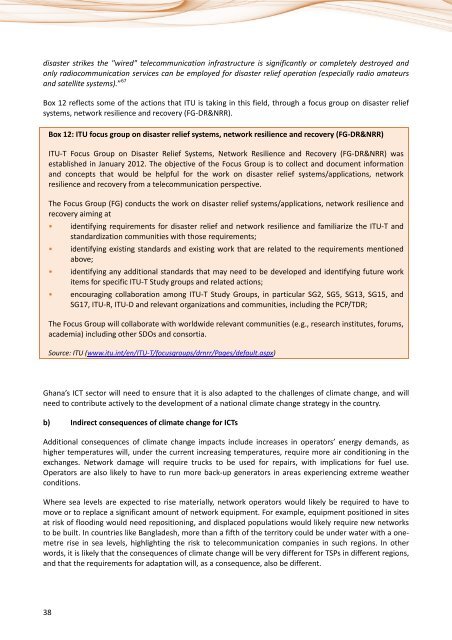Information and communication technologies (ICTs) and ... - ITU
Information and communication technologies (ICTs) and ... - ITU
Information and communication technologies (ICTs) and ... - ITU
You also want an ePaper? Increase the reach of your titles
YUMPU automatically turns print PDFs into web optimized ePapers that Google loves.
disaster strikes the "wired" tele<strong>communication</strong> infrastructure is significantly or completely destroyed <strong>and</strong><br />
only radio<strong>communication</strong> services can be employed for disaster relief operation (especially radio amateurs<br />
<strong>and</strong> satellite systems).” 67<br />
Box 12 reflects some of the actions that <strong>ITU</strong> is taking in this field, through a focus group on disaster relief<br />
systems, network resilience <strong>and</strong> recovery (FG-DR&NRR).<br />
Box 12: <strong>ITU</strong> focus group on disaster relief systems, network resilience <strong>and</strong> recovery (FG-DR&NRR)<br />
<strong>ITU</strong>-T Focus Group on Disaster Relief Systems, Network Resilience <strong>and</strong> Recovery (FG-DR&NRR) was<br />
established in January 2012. The objective of the Focus Group is to collect <strong>and</strong> document information<br />
<strong>and</strong> concepts that would be helpful for the work on disaster relief systems/applications, network<br />
resilience <strong>and</strong> recovery from a tele<strong>communication</strong> perspective.<br />
The Focus Group (FG) conducts the work on disaster relief systems/applications, network resilience <strong>and</strong><br />
recovery aiming at<br />
• identifying requirements for disaster relief <strong>and</strong> network resilience <strong>and</strong> familiarize the <strong>ITU</strong>-T <strong>and</strong><br />
st<strong>and</strong>ardization communities with those requirements;<br />
• identifying existing st<strong>and</strong>ards <strong>and</strong> existing work that are related to the requirements mentioned<br />
above;<br />
• identifying any additional st<strong>and</strong>ards that may need to be developed <strong>and</strong> identifying future work<br />
items for specific <strong>ITU</strong>-T Study groups <strong>and</strong> related actions;<br />
• encouraging collaboration among <strong>ITU</strong>-T Study Groups, in particular SG2, SG5, SG13, SG15, <strong>and</strong><br />
SG17, <strong>ITU</strong>-R, <strong>ITU</strong>-D <strong>and</strong> relevant organizations <strong>and</strong> communities, including the PCP/TDR;<br />
The Focus Group will collaborate with worldwide relevant communities (e.g., research institutes, forums,<br />
academia) including other SDOs <strong>and</strong> consortia.<br />
Source: <strong>ITU</strong> (www.itu.int/en/<strong>ITU</strong>-T/focusgroups/drnrr/Pages/default.aspx)<br />
Ghana’s ICT sector will need to ensure that it is also adapted to the challenges of climate change, <strong>and</strong> will<br />
need to contribute actively to the development of a national climate change strategy in the country.<br />
b) Indirect consequences of climate change for <strong>ICTs</strong><br />
Additional consequences of climate change impacts include increases in operators’ energy dem<strong>and</strong>s, as<br />
higher temperatures will, under the current increasing temperatures, require more air conditioning in the<br />
exchanges. Network damage will require trucks to be used for repairs, with implications for fuel use.<br />
Operators are also likely to have to run more back-up generators in areas experiencing extreme weather<br />
conditions.<br />
Where sea levels are expected to rise materially, network operators would likely be required to have to<br />
move or to replace a significant amount of network equipment. For example, equipment positioned in sites<br />
at risk of flooding would need repositioning, <strong>and</strong> displaced populations would likely require new networks<br />
to be built. In countries like Bangladesh, more than a fifth of the territory could be under water with a onemetre<br />
rise in sea levels, highlighting the risk to tele<strong>communication</strong> companies in such regions. In other<br />
words, it is likely that the consequences of climate change will be very different for TSPs in different regions,<br />
<strong>and</strong> that the requirements for adaptation will, as a consequence, also be different.<br />
38

















